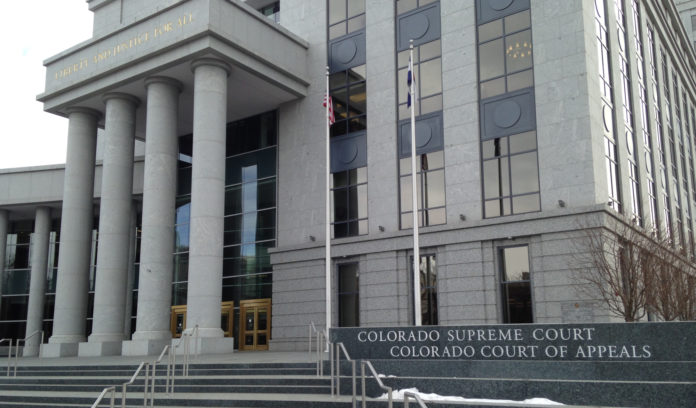
Editor’s Note: Law Week Colorado edits court opinion summaries for style and, when necessary, length.
Garcia v. Colorado Cab Company
Jose Garcia sued Colorado Cab Company LLC to recover from severe injuries he suffered while attempting to aid one of Colorado Cab’s drivers, Ali Yusuf. Garcia discovered Yusuf being assaulted by Yusuf’s passenger, Curt Glinton, the opinion noted. Enraged by Garcia’s interference, Glinton attacked Garcia, first with his fists and then with the cab itself. The jury determined Colorado Cab was liable for failing to install certain protective devices and awarded Garcia damages.
In a split decision, a division of the Colorado Court of Appeals concluded Garcia’s injuries resulting from Glinton’s theft and use of the cab as a weapon were “outside the risks reasonably to be anticipated” from both Colorado Cab’s negligence and Garcia’s rescue attempt. Glinton’s theft of the cab and subsequent use of it as a weapon were superseding causes that broke the causal chain between Colorado Cab’s negligence and Garcia’s injuries. Garcia challenged the division majority’s superseding-cause ruling.
The broader question presented to the Colorado Supreme Court was how to analyze proximate cause in the rescuer context. The state Supreme Court held, that to prove proximate cause, the rescuer must show their injuries were reasonably foreseeable based on the defendant’s alleged tortious conduct and the nature of the rescue attempt. While the Colorado Supreme Court agreed with much of the division majority’s analytical framework, it concluded it erred by deciding the issue of proximate cause as a matter of law.
The Colorado Supreme Court reversed the judgment of the Court of Appeals and reinstated the jury’s verdict.
People in the interest of children and concerning J.L.M. and J.P.
Two opinions that were announced six days apart in the spring of 2005, People v. Madera and Alcon v. Spicer, are front and center in this dependency and neglect proceeding. Washington County — i.e. the Washington County Department of Human Services and the Board of County Commissioners of Washington County — contended the district court erred when it failed to adhere to Madera in granting the father’s request for an in-camera review of documents allegedly protected by the attorney-client privilege, the opinion noted. The district court and the father countered that Madera is not applicable and the challenged ruling is free of error because it was consistent with our decision in Alcon.
In Madera, the Colorado Supreme Court held, in the context of a criminal defendant’s post-plea ineffective assistance of counsel claim, a request for an in-camera review of a defense counsel’s entire case file may not be granted without an adequate factual basis supporting a good faith belief by a reasonable person that not all the documents in the case file are protected by the attorney-client privilege. It also explained the court must use a six-part analytical framework to determine whether the party seeking an in-camera review has established the requisite factual basis.
In Alcon, the Colorado Supreme Court held, in the context of a civil personal injury claim, that when a party wishes to assert a privilege in response to a discovery request, the rules of civil procedure require notification to the other party via a privilege log that identifies the documents withheld and explains the privilege claim. It also emphasized “[t]he documents must be described in the log with sufficient detail so that the opposing party and, if necessary, the trial court can assess the claim of privilege as to each withheld communication.” The Colorado Supreme Court added after reviewing the privilege log, if the party seeking discovery persists in its contention the asserted privilege does not apply, it may request “an in-camera inspection of the challenged documents entered on the privilege log.” It said the trial court can perform such an in-camera review if it finds the log produced doesn’t permit a proper assessment of the privilege claim.
In this case, in response to a subpoena served by the father, Washington County provided a privilege log listing documents allegedly protected by the attorney-client privilege. After reviewing the log, the father insisted the privilege didn’t apply, and the parties were unable to resolve their dispute informally. Consequently, the father asked the district court to conduct an in-camera inspection of the documents identified in the log. Because the log provided vague descriptions of the withheld documents, the district court couldn’t assess Washington County’s claim of privilege. The court granted the father’s request for an in-camera review. In doing so, the district court neither made Madera’s required findings nor employed Madera’s analytical framework, the opinion added.
Washington County asserted the district court’s failure to conform to Madera rendered the in-camera order faulty. But the district court and the father responded Madera doesn’t apply. Instead, they maintain, Alcon applies.
The Colorado Supreme Court concluded the district court correctly followed Alcon, not Madera, in this civil case. And it further concluded, consistent with Alcon, the court correctly granted the father’s request for an in-camera review because Washington County’s log didn’t permit an assessment of the claim of privilege.
The Colorado Supreme Court discharged the rule to show cause.

